Dates: February 4-5, 2023
Venue: Sri Aurobindo Dhama, Sangama-Mekedatu, Karnataka
Watch a snippet video HERE.
See Photo-gallery HERE.
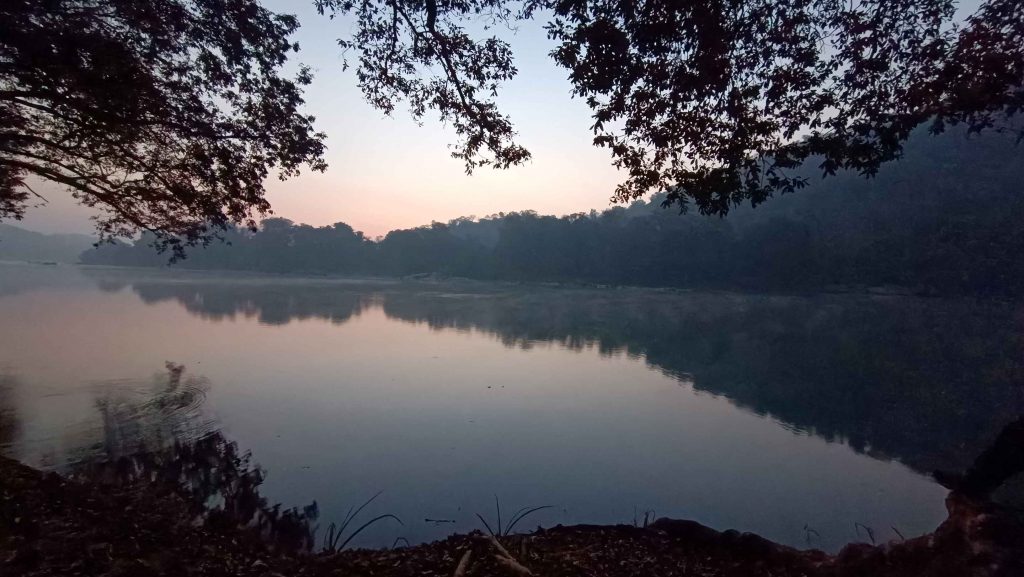
The BhāratShakti team planned and organised a deeply immersive retreat with the theme – Sri Aurobindo and the New Age. The residential retreat was hosted by Sri Aurobindo Dhama located in the serene and beautiful natural surroundings at the banks of Kaveri river in Sangama-Mekedatu in Kanakpura, Karnataka.
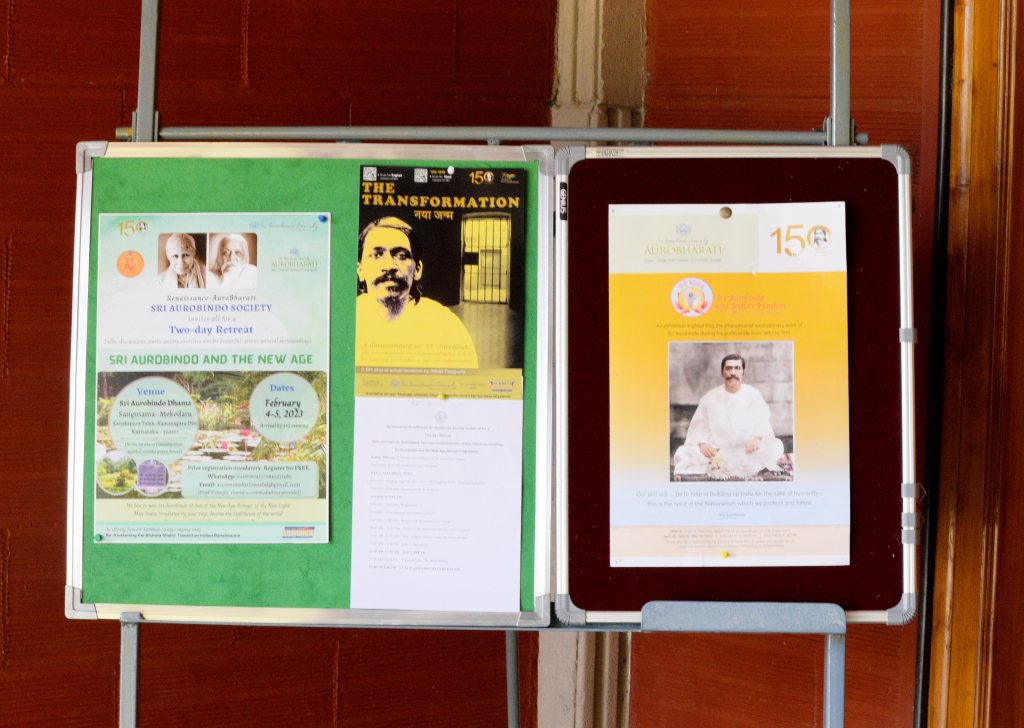
For more than two months our team, along with its several other responsibilities, worked hard to organise several details of the retreat. These included identifying the right topics for the talks and discussions as well as the most meaningful participatory activities and fun games which will keep the participants fully engaged and interested.
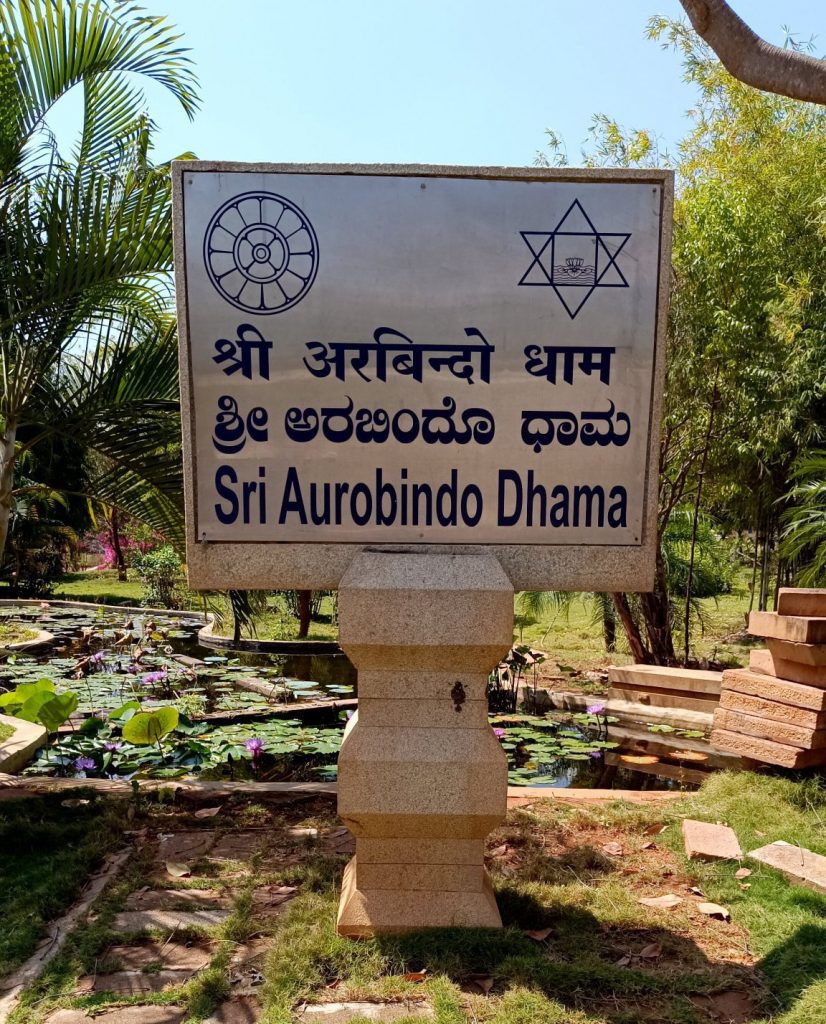
Our hosts in Karnataka took the responsibility of prior registration of the participants. About 30 participants including a large number of young people attended the retreat. The two teams were in regular contact to ensure smooth planning.
We all reached the retreat venue on the evening of 3rd February. An informal meet and greet happened after dinner; this helped the participants become familiar with one another and also with the facilitating team.
Day 1
The first session next morning, on the 4th February was mantra chanting and Savitri reading at 7:00 AM. Sitting in open outside the beautiful meditation room at Sri Aurobindo Dhama, the collective chanting session provided the right beginning for the retreat. The chanting was led by Dr. Beloo Mehra, who then also read selections from Savitri. This was followed by a brief silent meditation.
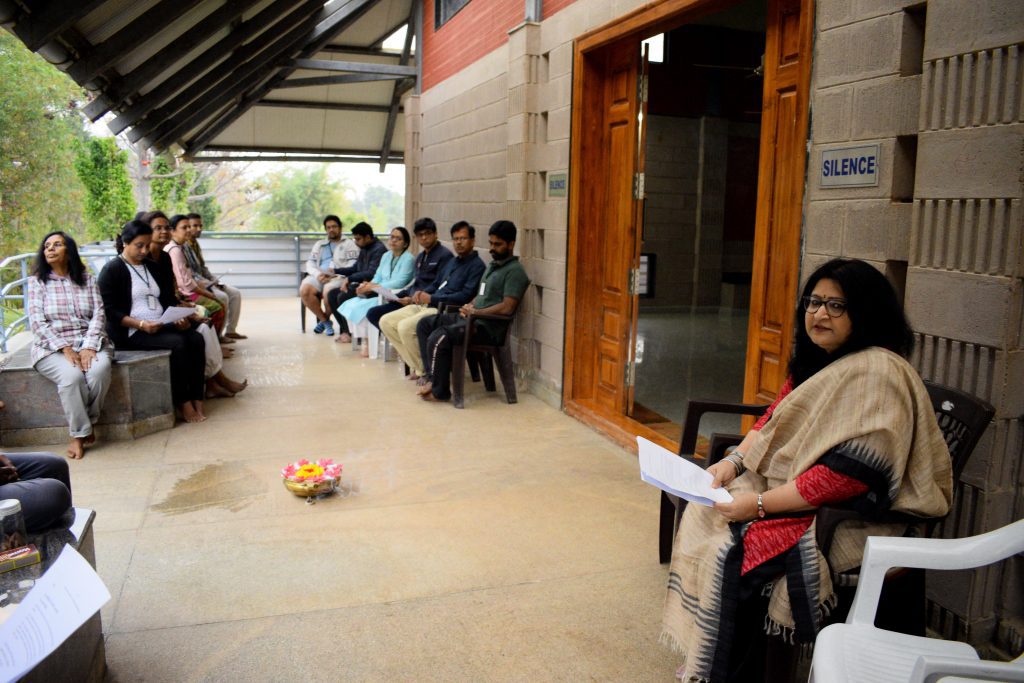
Next was the official check-in by the participants during which time each of them was handed a participant kit. These were prepared in advance by the Renaissance team. This kit also included a copy each of Sri Aurobindo Society’s publications such as AIM, Awakening and NAMAH. A bookstall with selections from Auropublications books was also set up. Several people purchased the books, with Gayatri Majumdar helping them with their purchase and overall handling the whole bookstall.
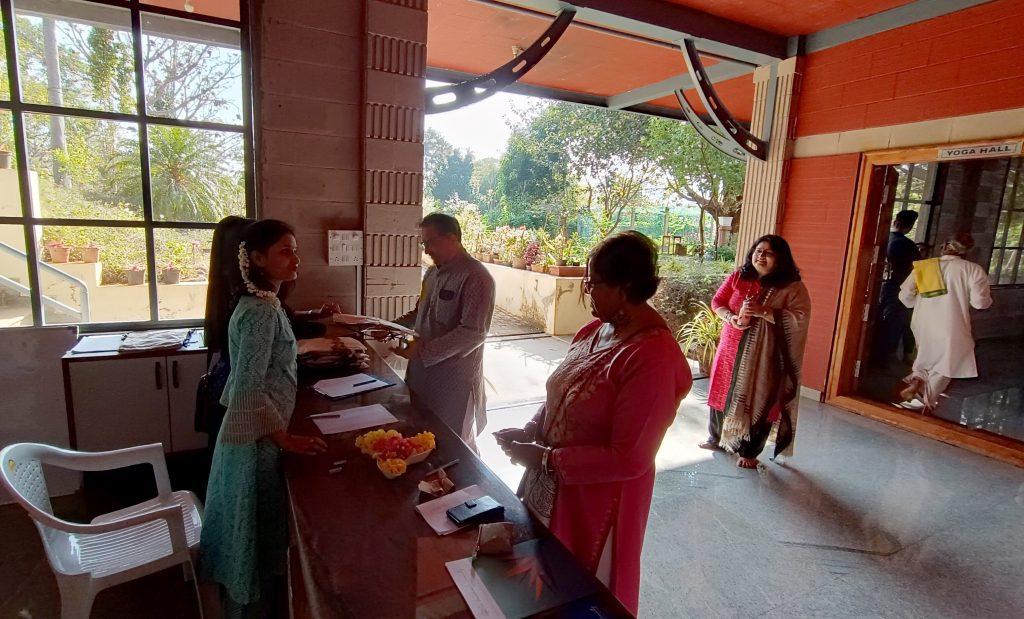

The formal programme began with concentration with Mother’s music. Mr. Madan Kandoi from Sri Aurobindo Dhama gave the initial welcome address and invited Dr. Mehra to give a brief overview of the retreat programme. During this time, the entire SAS team conducting the retreat was also introduced by Ms. Gayatri Majumdar. Dr. Mehra then requested Shri Aryamuni to speak about the vision of Sri Aurobindo Dhama.

Shri Aryamuni spoke briefly about his journey from the traditional Vedic sadhana to coming in contact with the teachings of the Mother and Sri Aurobindo and his inspiration to have a center focused around the vision of Sri Aurobindo and the Mother next to the existing Vedic gurukulam and other inspired projects dedicated to natural farming and sustainable living in harmony with nature.
He also mentioned how the Mother’s writings on prenatal education and conscious conception were instrumental in the deepening of his understanding of the significance of the work that has been going on in the Om Shanti Dhama and Veda Gurukulam.

The first topical session was titled ‘From Veda to Integral Yoga’. This was facilitated by Dr. Beloo Mehra who through carefully selected insights and passages from various writings of Sri Aurobindo highlighted how Sri Aurobindo’s Yoga takes up all the Yoga of the past and goes beyond.
She also cautioned that it should not be taken to mean that Sri Aurobindo represents some sort of culmination of the spiritual history of India and of mankind. Rather, we must always remember what the Mother said so clearly that Sri Aurobindo is beyond any history; he is the Future advancing towards its sure realisation.
During the session, several key elements of the philosophy and practice of Integral Yoga were also interwoven in. While part of the session involved a talk, there was also intense discussion toward the end in which the participants brought up some insightful questions and reflections.
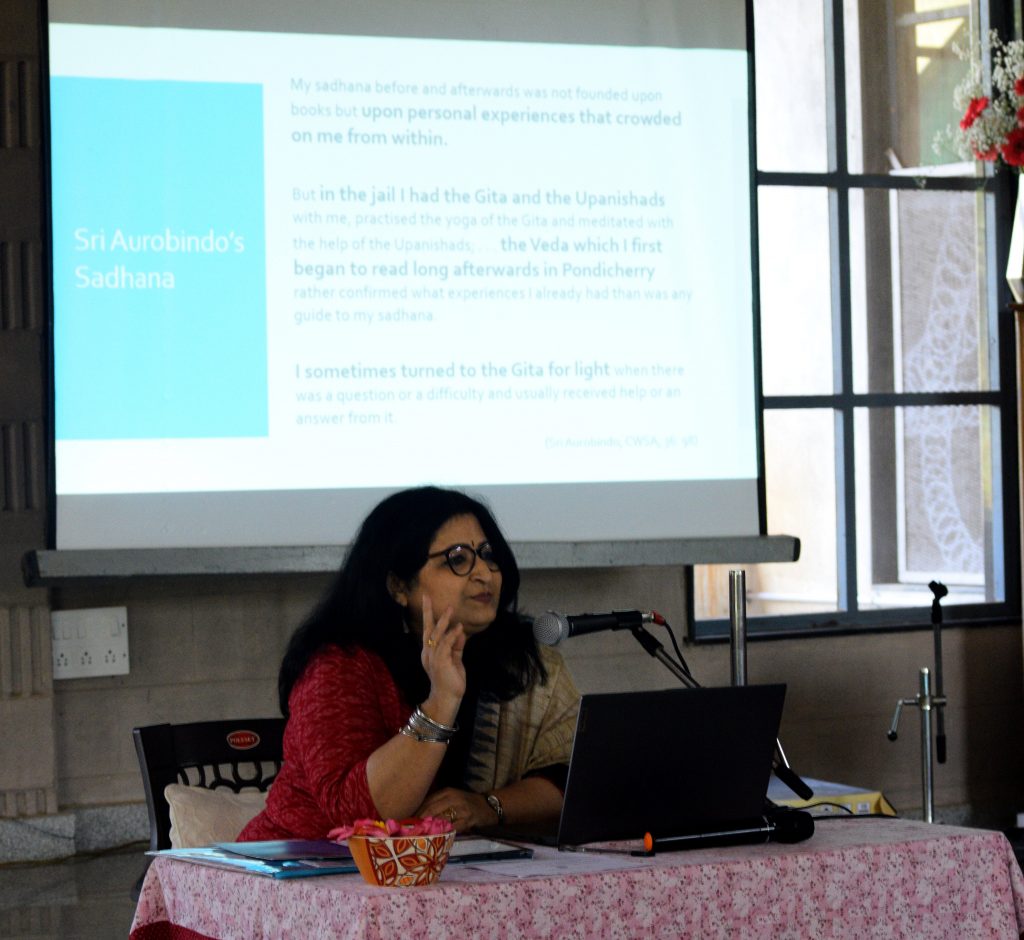
After the juice break, there was a more practice oriented session in which the idea of All Life is Yoga was taken up for discussion. Dr. Mehra shared a few specific examples in order to encourage participants to open up and express what they understand by sadhana, yoga and spiritual path.
A collection of definitions and descriptions on Yoga from various writings of Sri Aurobindo and the Mother was also distributed as reading and reference material.

After a sattvic lunch, the group was escorted to a walk through the area where the Vedic gurukulam is situated. A young brahmachari gave a heartfelt description of what he finds unique in the gurukula and how a beautiful integration of traditional Vedic learning and modern curriculum is a part of his overall studies at the gurukulam.
He shared how he feels blessed to be living in the beautiful serene environment and does not miss the so-called modern amenities-studded life in the city. He also said that he is confident that this experience of studying at the gurukulam is preparing him for a purposeful life as an adult. He shared a few things about the traditional Vedic curriculum that he is studying.

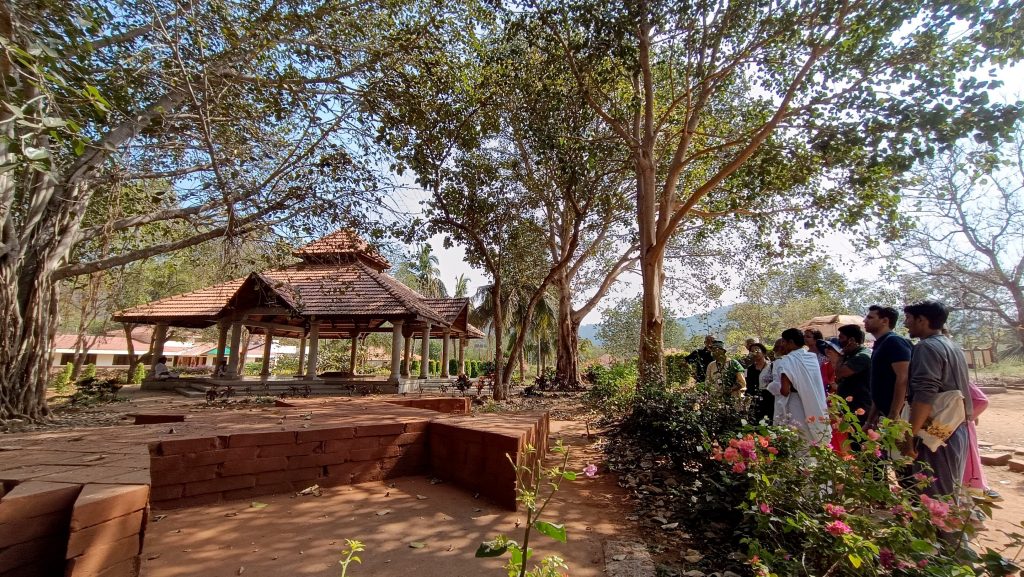
As part of this Nature walk, the group was asked to gather one or two objects from the nature – leaves, sticks, stones, except flowers, anything that resonated with them or spoke to them — and bring it to the retreat hall for the next session. The next session titled ‘Mother Nature and I’ was inspired by the Mother’s account of her close identification with Nature.
Some relevant passages from the Mother were shared with the participants by Gayatri Majumdar. Participants were then divided into two groups and each group was asked to create a collaborative kolam with found objects from Nature. They were asked to do this work in silence so as to feel a connection with each and every little gift of Mother Nature. And the fact that they were doing this creative work in a group was to emphasise the idea of harmony that can come through as we each bring our highest consciousness to the work.


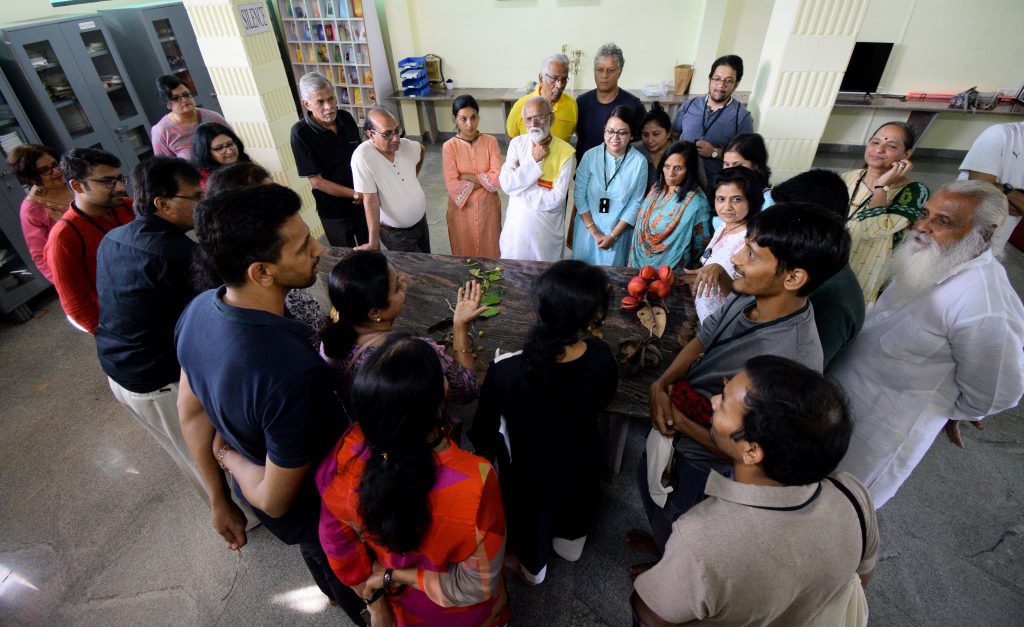
This was followed by a session on Twelve soul-qualities. This was also designed as a game for which Biswajita Mohapatra had designed beautiful bookmarks – one set with a small quote from the Mother or Sri Aurobindo describing each of the twelve qualities, and the other set with pictures of the flowers associated with the qualities and some hint about the specific quality.
Each participant was asked to pick out two bookmarks – one which has a quote and the other with the flower picture and they were supposed to match the two so that both are about the same quality. Once everyone had picked out the bookmarks, they were asked to share what they matched. Some had identified correctly, but others had not. Dr. Beloo Mehra helped them identify the right flower bookmark for the quality they picked out. Through this fun game, some aspects related to each of the 12 qualities were briefly explored.
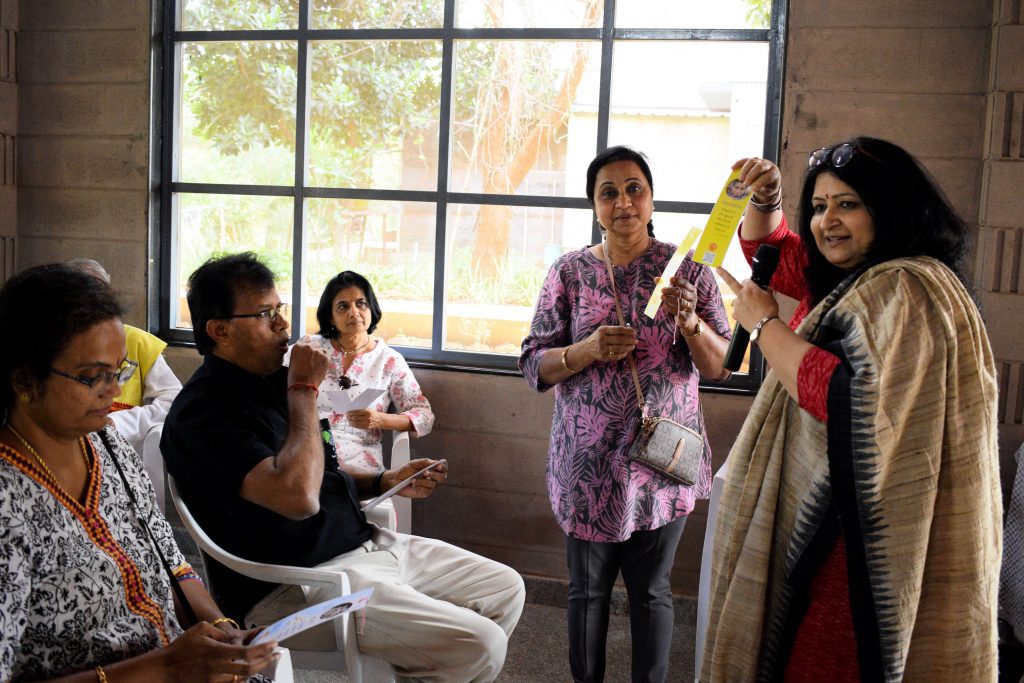
After the tea break, Gayatri Majumdar gave a talk on ‘Appreciating Sri Aurobindo’s Poetry’. She spoke briefly about Sri Aurobindo’s vast body of work as a poet, starting from his earliest poem published at the age of 11 to his mantric epic Savitri. As a poet and student of poetry, she contextualized Sri Aurobindo’s style of poetry both in the Indian poetic tradition starting from the Veda and Upanishads and also the long history of English and European poetry.
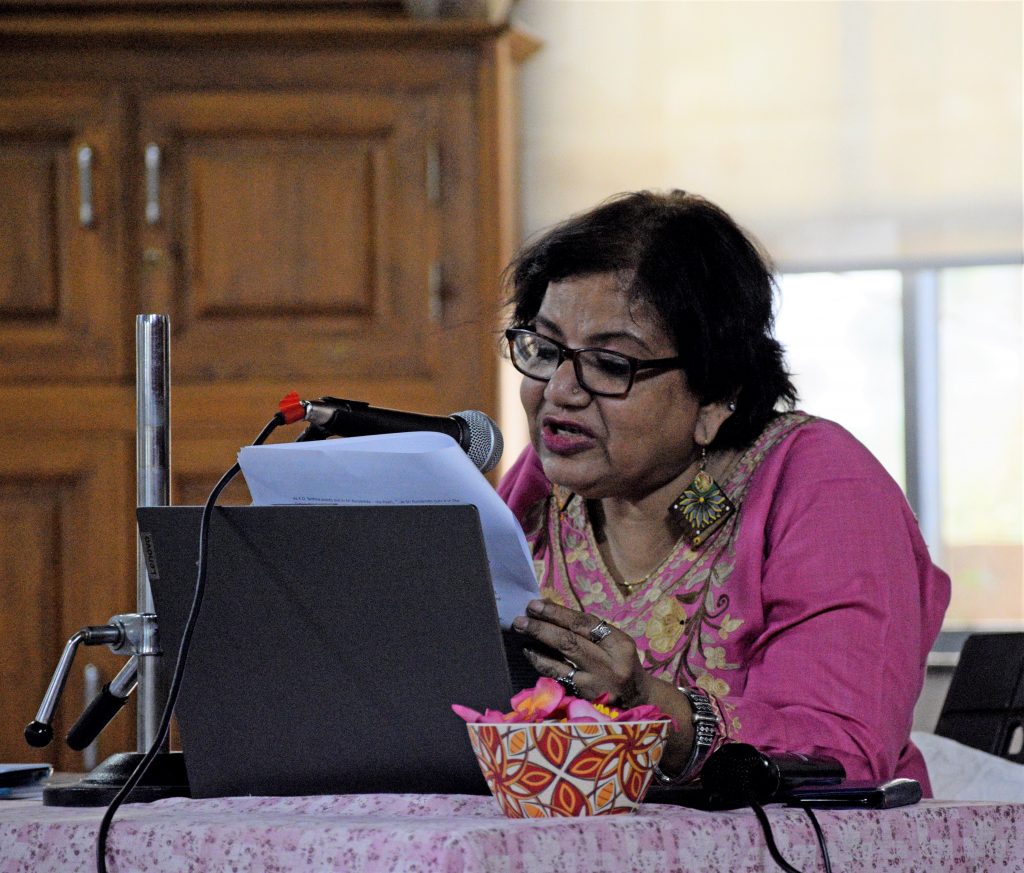
Highlighting the meaning of kavi and rishi, she identified a few of Sri Aurobindo’s poems which illustrate the work of the ‘seer-poet’ Sri Aurobindo. She also showed a few short videos inspired by Sri Aurobindo’s poems.
Ms. Majumdar also gave a brief account of the Ashram poetry department, and Sri Aurobindo as a poet-maker. She read a few poems from some of the Ashram poets. She also read one of her own poems toward the end of the session.
This was followed by another activity-based session inspired by the Mother’s words ‘Let Beauty be Your Constant Ideal’. This involved working with flowers. Biswajita Mohapatra shared a few of the Mother’s words on Beauty as an important value to aspire toward. Dr. Mehra also emphasised the Mother’s deep connection with flowers.
The participants were asked to divide themselves in five small groups. Each group was given a bag full of flowers and some tealight candles. With beautiful music playing in the background the groups set out to work and allow their creativity to emerge spontaneously. The final pookolam-s created by each of the groups were mesmerising. All the groups then walked around the space and saw others’ creations.
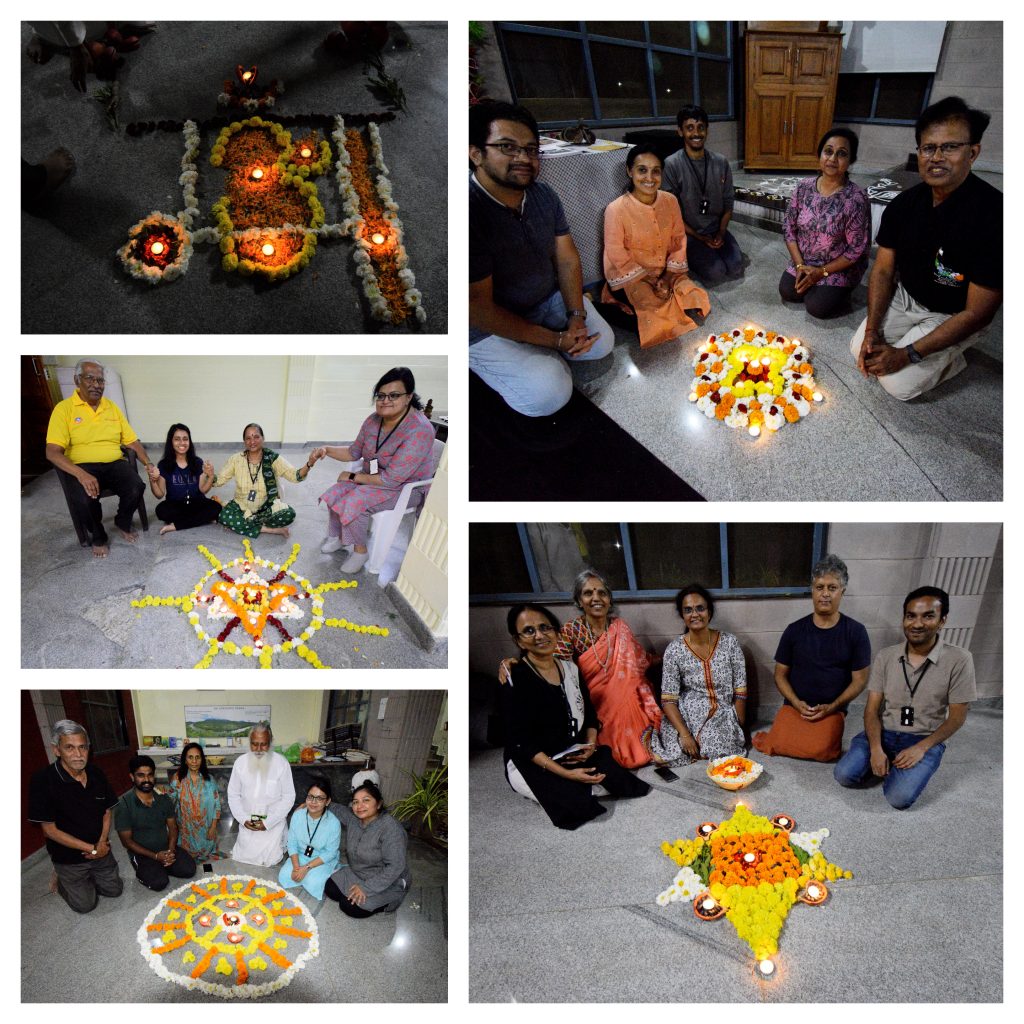
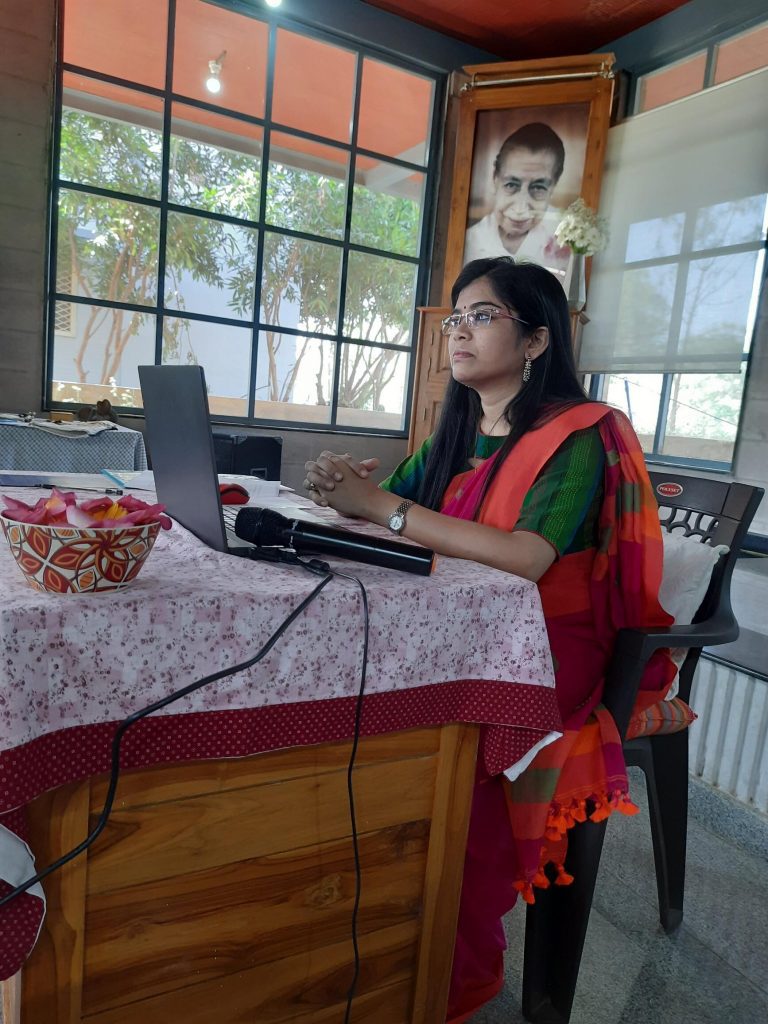
Post-dinner was the screening of the film ‘The Transformation’. Shruti Ramteke gave a brief background of how the documentary came into being and some of its defining characteristics.
She shared about the public screenings of the film that have been done so far and the accolades and awards that have been showered at it at various international film festivals.
Watching the documentary highlighting Sri Aurobindo’s transformative experience in Alipore prison was a moving experience for most of the participants. This was evident through the contemplative silence that lingered in the hall after the film ended.

Day 2
Day 2 began with an early morning walk to the riverbank. There at the banks of Ma Kaveri, the morning mantra chanting and Savitri reading session became an even more beautiful experience. After a brief silent meditation, the group enjoyed the beautiful natural surroundings and morning tea.
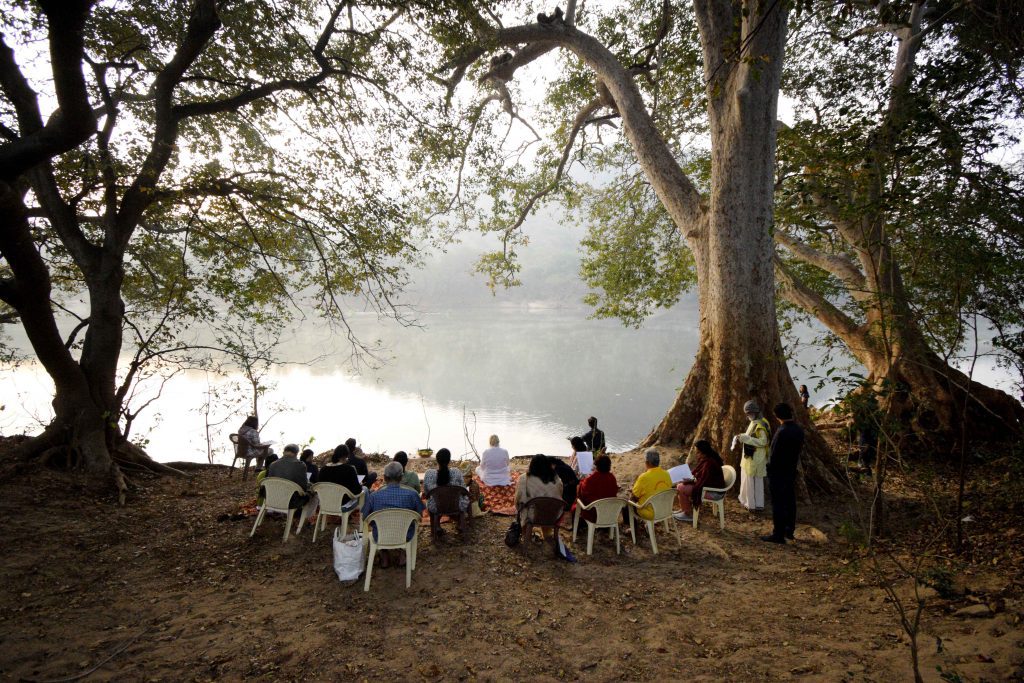
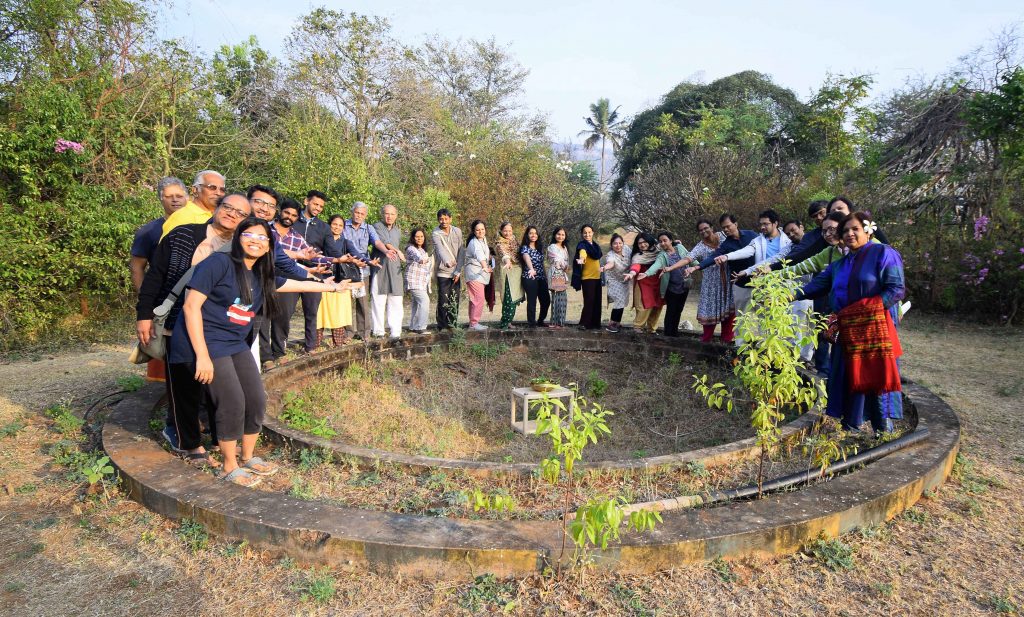
After concentration with the Mother’s music, the day began with the first session titled ‘Dual Avatara and the New World’. Facilitated by Dr. Mehra, this session focused on the work of the Mother as spiritual collaborator of Sri Aurobindo to bring down on earth the new Supramental Consciousness.
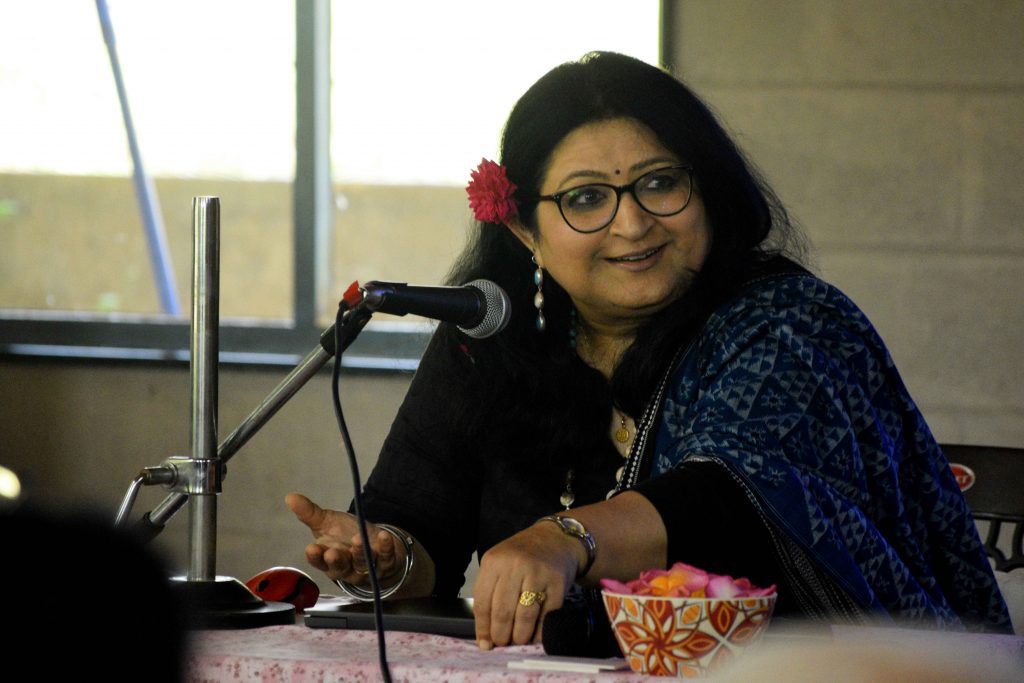
Dr. Mehra emphasised the significance of the Supramental Manifestation for the future evolution of humanity and earth, and for transformation of the earthly life into a divine life.
Relevant passages from Sri Aurobindo’s and Mother’s works were highlighted throughout the presentation. Interesting discussion followed this session.
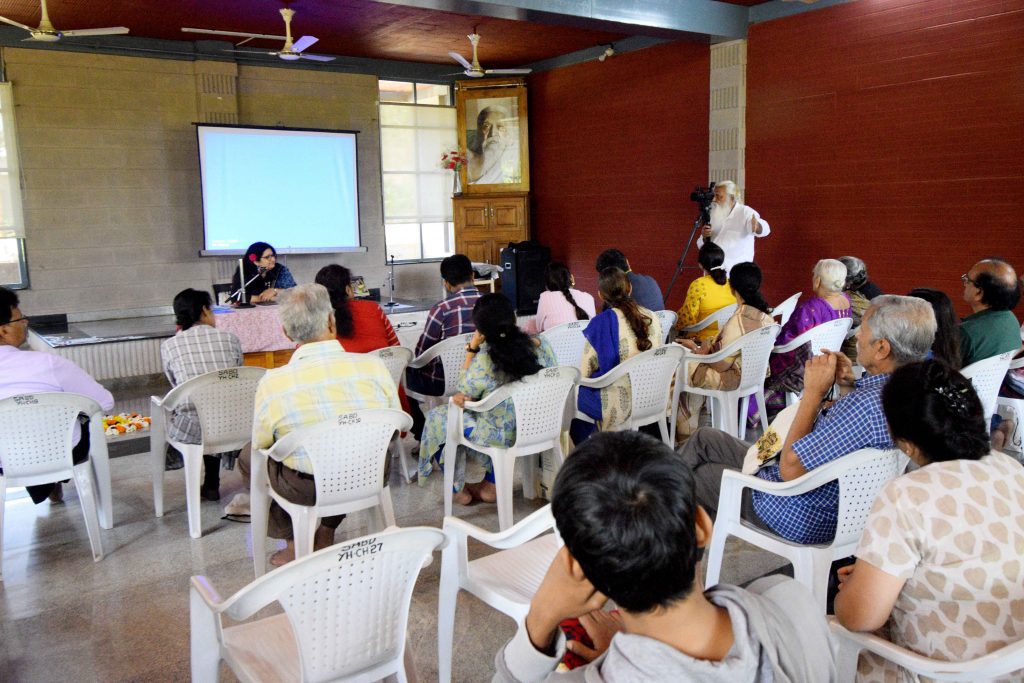
Next was an experiential session meant to highlight the significance of work as an important part of sadhana. Participants were asked to reflect on their experience at the retreat and express it in any form they find appropriate – writing a short piece, composing a poem, doing a drawing, sketching, or coloring a mandala. This exercise was done in silence to facilitate further internalization of the experience.
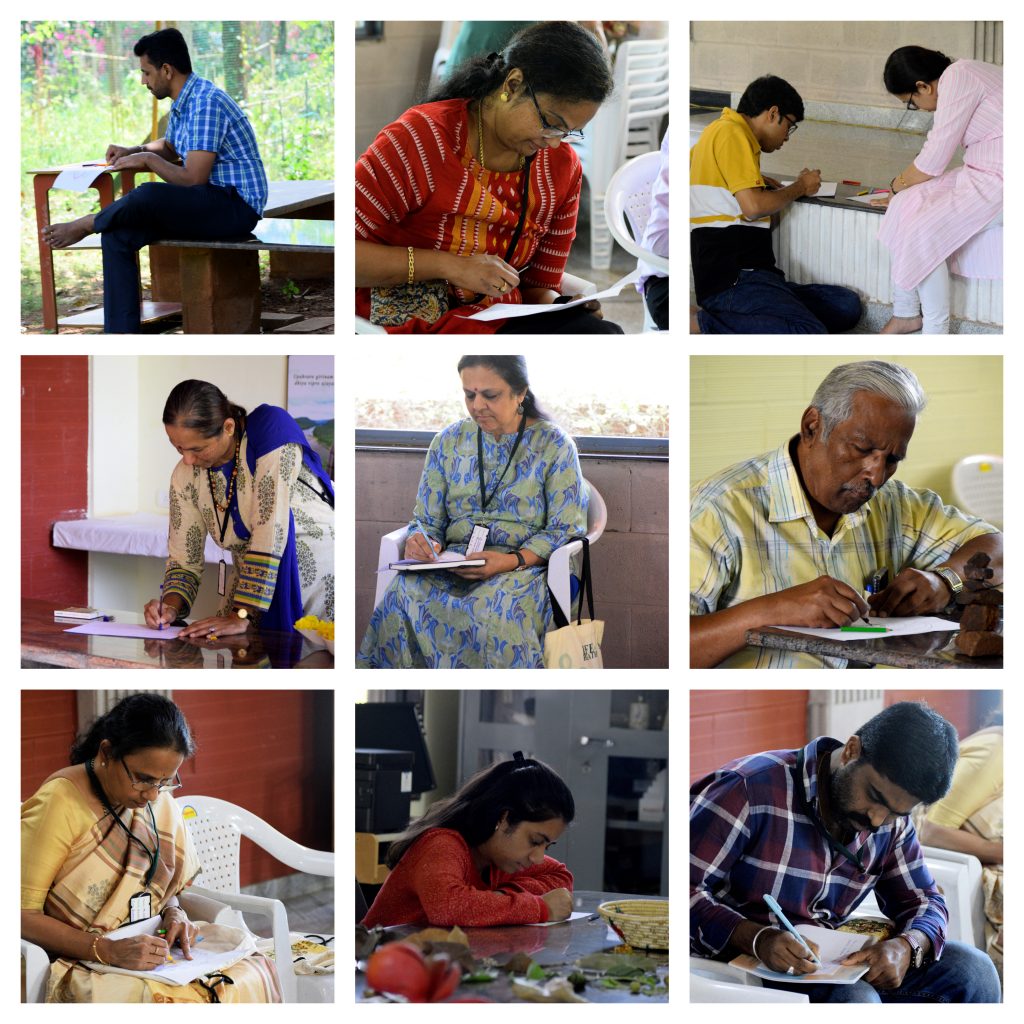
During the collective sharing time after this, some of the participants shared their poems that emerged through their contemplation on the retreat experience. This was deeply appreciated by all as many people could resonate with the essence of the sharing.
Some of the participants shared spontaneously what this experience has meant for them. There was a unanimous feeling of gratitude and love for the Mother which bonded the whole group together during this entire program.
Next up was certificate distribution and prasad. Each participant was also asked to pick a card from the stack of specially designed flower cards based on spiritual significance of flowers. These cards were designed in-house by Biswajita Mohapatra.
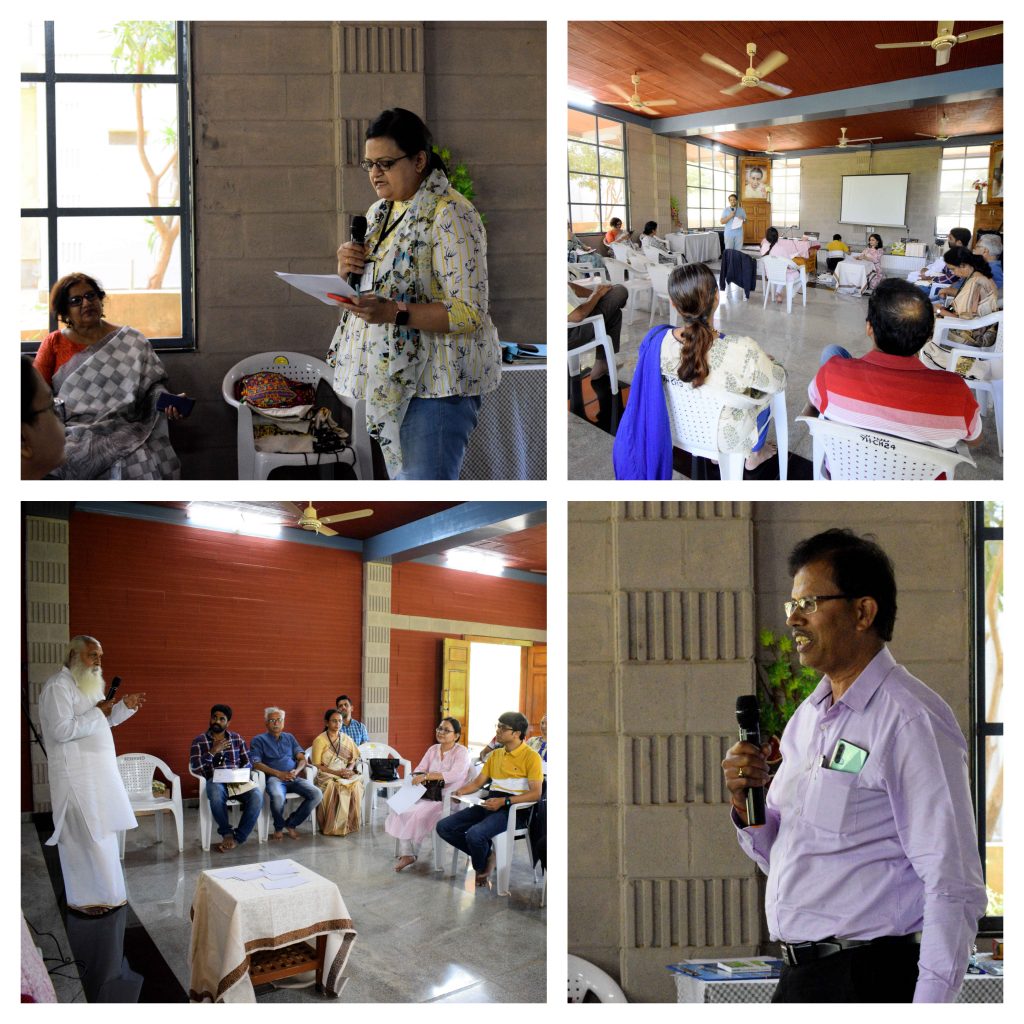
The programme came to a conclusion with a few moments of silent concentration, and offering of all the work accomplished during the two days to the Mother.

Some Feedback from Participants
- This program was well organized. Thank you, extremely grateful for such caring and thoughtful arrangements. (Smitha G.)
- The programme was very nicely organized and conducted. It’s feeling like a family in the retreat. My lots and lots of gratitude to the organizers, all the facilitators and finally Sri Aurobindo and The Mother for giving this opportunity. (Runalika Roy)
- Amazing, Fantastic, Eye opener, Relaxed of much more. (Sneh Kandoi)
- Awesome knowledge & presented in awesome way. Nicely organized. (M. Hari Krishna)
- Thank you for the wonderful hospitality and neat conducive environment and conversations to experience the divine. (Manohar CS.)
- Such retreats may please be conducted occasionally at least once a quarter. Vasant Kadle
- Well organized in terms of content, time and lots of heartfulness. Please keep conducting programs like these and keep the awareness alive in all segments of society. (Vandana Ramanathan)
- Excellent! Excellent! Excellent! (Siraj Datta)
- It was an excellent programme. Well organized & very informative. Different experience. (V. Ramanathan)
- The workshop was well-organised. (Vaishali G. Bhandari)
- The programme was just lovely with the physical which we had. It was the gwed to the seat, not wanting to get up. And the movie viewing was very nice. Frist time I had seen a glimpse of a part of Sri Aurobindo. (Shashi Bhuwania)
- Grateful to Almighty. Attitude of Gratitude. (Balaji SR)
A WhatsApp group with the retreat participants is active as participants occasionally share there something from their ongoing readings of the works of Sri Aurobindo and the Mother. A couple of them have already joined an ongoing online study group facilitated every Friday by Dr. Mehra. Participants also used this group to share their videos and photographs from the retreat. Some of these are being slowly shared by the Renaissance team on its social media.
